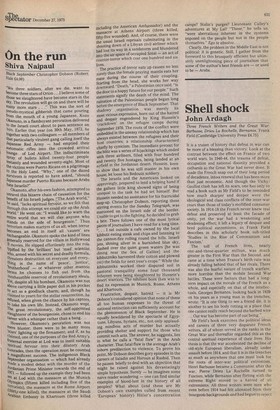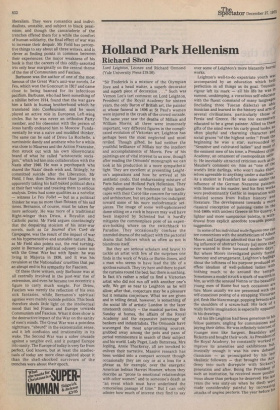Shell shock
John A rdagh
Three French Writers and the Great War: Barbusse, Drieu La Rochelle, Bernanos. Frank Field (Cambridge University Press £4.75) It is a truism of history that defeat in war can be more of a blessing than victory. Look at the contrast between the effect on France of two world wars. In 1940-44, the trauma of defeat, occupation and national disunity provided a catharsis as the Great War had never done. It made the French snap out of their long period of decadence, intaa renewal that has been more than just economic. And though the Vichy/ Gaullist clash has left its scars, one has only to read a book such as Mr Field's to be reminded how much sharper and deeper were the ideological and class conflicts of the inter-war years than those of today's mollified consumer society. In 1914-18 the French never knew real defeat and preserved at least the facade of unity, yet the war had a weakening and deadening effect; it left a legacy of despair and bred political extremisms, as Frank Field describes in this scholarly book sub-titled 'Studies in the Rise of Communism and Fascism.'
The toll of French lives, nearly one-and-three-quarter million, was much greater in the First War than the Second, and came at a time when France's birth-rate was already falling behind that of her rivals. There was also the fearful nature of trench warfare, more horrible than the mobile Second War battles. These were factors that had a longterm impact on the morale of the French as a whole, and especially on that of the intellectuals. Georges Bernanos, looking back in 1939 on his years as a young man in the trenches, wrote: "It is one thing to see a friend die, it is another to see his body rotting in a place that one cannot really reach beyond the barbed wire ... Our war has become part of our being " Mr Field's book examines the political ideas and careers of three very disparate French writers, all of whom served in the ranks in the Great War and thereafter regarded this as the central spiritual experience of their lives. His thesis is that the war accelerated the decline of old-style European liberalism, already under assault before 1914, and that it is in the trenches as much as anywhere that one must look for the roots of inter-war political extremism. Henri Barbusse became a Communist after the war, Pierre Drieu La Rochelle turned to Fascism, while Bernanos after flirting with the extreme Right moved to a hatred of :All extremisms. All three writers were men who even before 1914 had felt alienated from their bourgeois backgrounds and had begun to reject
liberalism. They were romantics and individualists, unstable, and subject to black pessimism; and though the camaraderie of the trenches offered them for a while the comfort of human solidarity, the final effect of war was to increase their despair. Mr Field has perceptive.things to say about all three writers, and is clever at finding points in common between their experiences: the major weakness of his book is that the careers of this oddly-assorted trio only bear marginally on the central theme of the rise of Communism and Fascism.
Barbusse was the author of one of the most famous of the Great War's anti-war novels, Le Feu, which won the Goncourt in 1917 and came close to being banned for its infectious pacifism. Barbusse, who had been something of a nihilist before 1914, found that the war gave him a faith in humaq brotherhood which he translated into Corrirnunism, and he soon . played an active role in European Left-wing circles. But he was never an orthodox Party member, and his obsession with the person of Jesus hardly endeared him to Moscow. Fundamentally he was a naive and muddled thinker. The same can be said of Drieu La Rochelle, a narcissistic dandy and aesthete who for a while was close to Maurras and the Action Francaise, then struck out with his own idiosyncratic brand of what he called "aristocratic socialism," which led him into collaboration with the Nazis after 1940. He was a psychopath who shared the Nazis' death-wish and, fittingly, he committed suicide after the Liberation. Mr Field, I fear, does Drieu more than justice in apparently taking his half-baked political dicta at their fact value and treating them to serious analysis. Drieu had some qualities as a novelist — witness Le Feu Follet — but as a political thinker he was no more than flotsam of his sad times. Bernanos, of course, must be taken far more seriously. He was more of a traditional Right-winger than Drieu, a Royalist and Catholic purist. Mr Field argues convincingly that the despairing stoicism of his inter-war novels, such as Le Journal d'un Cur-i de Campagne, was the result of the impact of war on his hypersensitive and unstable nature. But, as Mr Field also points out, the real turningpoint in Bernanos' political odyssey came not with the Great War but with Spain: he was living in Majorca in 1936, and it was his revulsion at the Nationalists' cruelties that put an abrupt end to his sympathy for Fascism.
Of these three writers, only Barbusse was at all centrally involved in the post-war rise of extremism, and even he became too eccentric a figure to carry much weight. For Drieu, Fascism was merely the reflection of his own sick fantasies, while. Bern anos's spiritual agonies were mainly outside politics. This book therefore sheds little light on the intellectual mood that led France and Europe towards Communism and Fascism. What it does show is the destructive impact of the War on the sanity of men's minds. The Great War was a pointless nightmare, "absurd" in the existentialist sense, and it left confusion and irrationality in its wake. The Second War was a sober crusade against a tangible evil, and it purged Europe into sanity. The Europe of today is very far from perfect, God knows, but at least the intellectuals of today are more clear-sighted about it than the shell-shocked survivors of the trenches were about their epoch.



































 Previous page
Previous page